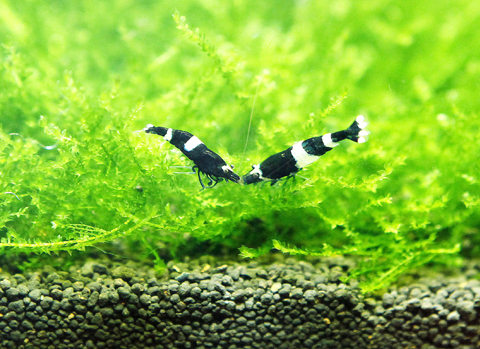Rare tiny black and white shrimp raised in Taiwan are selling for as much as US$830 a piece to collectors in Japan, despite short life spans and problems breeding, officials at an exhibition said yesterday.
The black King Kong shrimp (黑金剛), about 2,000 of which are being raised by just four Taiwanese breeders armed with technology and reservoirs of patience, sustain interest among buyers because of their novelty in aquariums and the off-chance they will breed.
“It’s the Japanese character to collect odd or rare stuff, but their success with the shrimp isn’t too high,” Taiwan Ornamental Fish Association (中華水族協會) secretary-general Sharman Chou (周旭明) said.

PHOTO: NICKY LOH, REUTERS
Black King Kong shrimp, centimeter-long critters known for black shells with white spots, live for about 16 months.
BREEDING
Once native to southern China but modified by breeders in Japan and finally Taiwan, which is the only source today, the shrimp requires pure fresh water at a fixed temperature to shed its shell every few weeks and remain fit enough to breed.
Prices vary from US$30 to US$830, said Chung Kuo-nan (鍾國南), publicity head with the Council of Agriculture’s Fisheries Agency, which encourages breeding the shrimp because farms take up only small plots of land and generate little pollution. They sell at auctions and online.
DISPLAY
To raise the black King Kong shrimp’s profile, the agency’s Taiwan Ornamental Fish Exibition in Taipei displayed a cooler-sized tank for a steady crowd, including many Japanese.
Breeder Wu Yi-chin from southern Taiwan said she was keen on the Japanese market after 30 years of raising King Kong shrimp but that breeding the creatures had not been easy.
“We have to do other business, including different kinds of tropical fish,” Wu said at the exhibition.

NO BREAKTHROUGH? More substantial ‘deliverables,’ such as tariff reductions, would likely be saved for a meeting between Trump and Xi later this year, a trade expert said China launched two probes targeting the US semiconductor sector on Saturday ahead of talks between the two nations in Spain this week on trade, national security and the ownership of social media platform TikTok. China’s Ministry of Commerce announced an anti-dumping investigation into certain analog integrated circuits (ICs) imported from the US. The investigation is to target some commodity interface ICs and gate driver ICs, which are commonly made by US companies such as Texas Instruments Inc and ON Semiconductor Corp. The ministry also announced an anti-discrimination probe into US measures against China’s chip sector. US measures such as export curbs and tariffs

The US on Friday penalized two Chinese firms that acquired US chipmaking equipment for China’s top chipmaker, Semiconductor Manufacturing International Corp (SMIC, 中芯國際), including them among 32 entities that were added to the US Department of Commerce’s restricted trade list, a US government posting showed. Twenty-three of the 32 are in China. GMC Semiconductor Technology (Wuxi) Co (吉姆西半導體科技) and Jicun Semiconductor Technology (Shanghai) Co (吉存半導體科技) were placed on the list, formally known as the Entity List, for acquiring equipment for SMIC Northern Integrated Circuit Manufacturing (Beijing) Corp (中芯北方積體電路) and Semiconductor Manufacturing International (Beijing) Corp (中芯北京), the US Federal Register posting said. The

India’s ban of online money-based games could drive addicts to unregulated apps and offshore platforms that pose new financial and social risks, fantasy-sports gaming experts say. Indian Prime Minister Narendra Modi’s government banned real-money online games late last month, citing financial losses and addiction, leading to a shutdown of many apps offering paid fantasy cricket, rummy and poker games. “Many will move to offshore platforms, because of the addictive nature — they will find alternate means to get that dopamine hit,” said Viren Hemrajani, a Mumbai-based fantasy cricket analyst. “It [also] leads to fraud and scams, because everything is now

MORTGAGE WORRIES: About 34% of respondents to a survey said they would approach multiple lenders to pay for a home, while 29.2% said they would ask family for help New housing projects in Taiwan’s six special municipalities, as well as Hsinchu city and county, are projected to total NT$710.65 billion (US$23.61 billion) in the upcoming fall sales season, a record 30 percent decrease from a year earlier, as tighter mortgage rules prompt developers to pull back, property listing platform 591.com (591新建案) said yesterday. The number of projects has also fallen to 312, a more than 20 percent decrease year-on-year, underscoring weakening sentiment and momentum amid lingering policy and financing headwinds. New Taipei City and Taoyuan bucked the downturn in project value, while Taipei, Hsinchu city and county, Taichung, Tainan and Kaohsiung